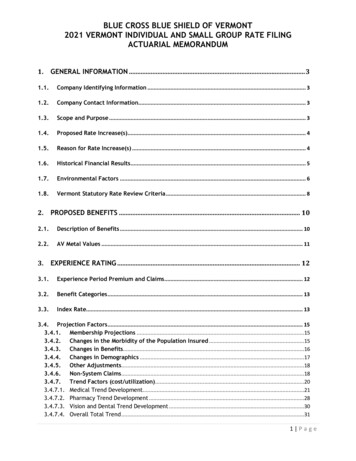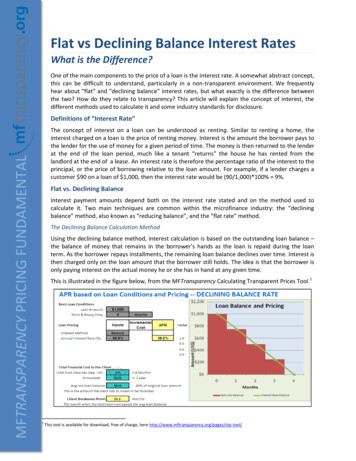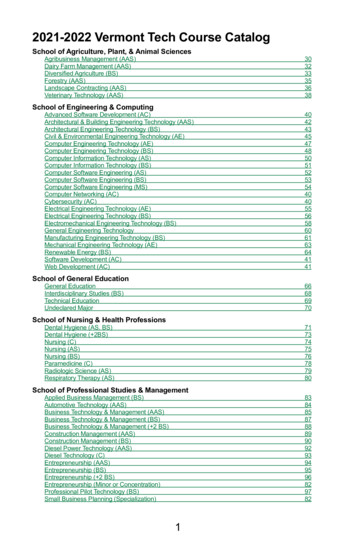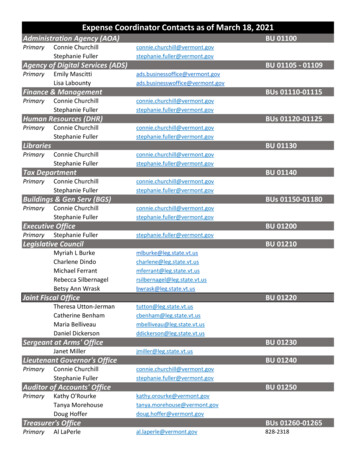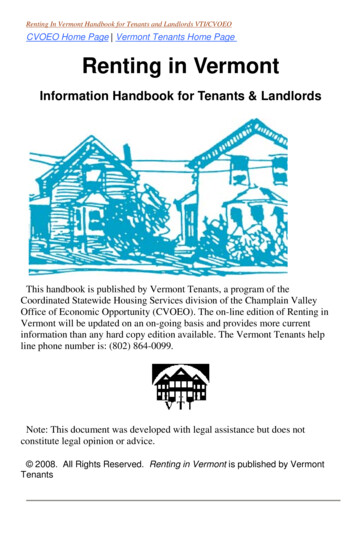
Transcription
Renting In Vermont Handbook for Tenants and Landlords VTI/CVOEOCVOEO Home Page Vermont Tenants Home PageRenting in VermontInformation Handbook for Tenants & LandlordsThis handbook is published by Vermont Tenants, a program of theCoordinated Statewide Housing Services division of the Champlain ValleyOffice of Economic Opportunity (CVOEO). The on-line edition of Renting inVermont will be updated on an on-going basis and provides more currentinformation than any hard copy edition available. The Vermont Tenants helpline phone number is: (802) 864-0099.Note: This document was developed with legal assistance but does notconstitute legal opinion or advice. 2008. All Rights Reserved. Renting in Vermont is published by VermontTenants
Renting In Vermont Handbook for Tenants and Landlords VTI/CVOEOTable of ContentsTwo ways to navigate this book on-line: 1) Click on the chapter name belowto go to the chapter you are looking for. or 2) You can navigate easily to aparticular topic by opening the PDF Bookmark tab on the left side of theAdobe Acrobat window and click on the chapter/subchapter link to go to thespecific topic you are looking for.Chapter 1. Beginning a TenancyChapter 2. Tenant ProtectionsChapter 3. Housing CodesChapter 4. Moving OutChapter 5. EvictionsBasic Responsibilities: A Quick Reference ListList of ResourcesAcknowledgmentsIntroductionThe Renting in Vermont handbook is intended to give tenants, landlords andothers a basic understanding of their rights and responsibilities. It summarizesVermont’s landlord/tenant statute Title 9: Commerce and Trade, Chapter 137:RESIDENTIAL RENTAL AGREEMENTS, as well as some municipal laws,state regulations and Vermont Court decisions that also govern thelandlord/tenant relationship. Renting in Vermont is to be used as a guide tobetter understand legal rights and help prevent some of the common problemswhich occur between tenants and landlords.Although this book was developed with legal assistance, nothing containedherein constitutes actual legal opinion or advice regarding any individual caseor situation. If you have questions about whether information in this bookapplies to you, you should seek legal advice.A Note on Mobile Homes and Mobile Home ParksThe laws discussed in Renting in Vermont do apply to tenants who are rentinga mobile home. They do not apply directly to people who own their mobilehome and are renting a lot in a mobile home park. These people are protectedby Vermont’s Mobile Home Park law, which is summarized in a booklet byCVOEO’s Mobile Home Project called “Guide to Your Rights as a MobileHome Resident.” www.cvoeo.org/htm/Housing/mobileHome/guide.html
Renting In Vermont Handbook for Tenants and Landlords VTI/CVOEOPeople who rent a mobile home in a park from the park owner are covered byboth landlord/tenant law as well as the Mobile Home Park laws. For furtherinformation on rights under Vermont’s Mobile Home Park law, or to receive afree hard copy of the “Guide to Your Rights as a Mobile Home Resident,” callthe CVOEO Mobile Home Project at 802-660-3451 x 105, or e/mobile home.htmlChapter 1. Beginning a TenancyResidential Leases and Rental AgreementsWhen a landlord and a tenant agree on renting an apartment, several thingsneed to be clearly laid out, including the amount of rent, when the rent is to bepaid, length of the tenancy and who pays for utilities and services. Rentalagreements can be either oral or written. Oral agreements are as binding aswritten agreements, but they do not provide written proof of the agreementterms, and while there is no law stating that a tenant must receive a writtenlease, it is always preferable for both parties to get any and all agreements inwriting. Tenants should always read leases carefully and ask about terms theydon’t understand, and should try to get landlords to change or remove leaseterms which seem unfair. Normally leases will be transferable from onelandlord to another if the building is sold. (See “Sale of the Building”)Tenants should always get photocopies of leases and all agreements that theysign. They should insist on receiving their copy as soon as the lease is signed.Without his/ her own copy of the lease, a tenant might have trouble provingwhat the parties agreed to. All written agreements should be kept in a safe andaccessible place to refer to if problems arise. Written agreements betweenroommates regarding financial and other responsibilities can also be helpful inpreventing problems. To obtain a sample roommate agreement from the VTIweb site go etterCentral.htmlThe rental agreement determines the specific rights and responsibilities ofboth tenants and landlords, but cannot take away basic rights granted understate, federal, or local laws. The landlord cannot enforce a lease provision thattakes away any rights the tenant has under the law, even if the tenant agrees tothe provision by signing the lease. For example, a clause that gives the landlordthe right to physically evict a tenant or shut off the utilities if rent is not paid ontime would be void by law and could not be enforced by the landlord.However, provisions of the lease that are legal would still be valid and couldbe enforced. If either landlords or tenants have questions about the legality of a
Renting In Vermont Handbook for Tenants and Landlords VTI/CVOEOclause in the lease, they should call one of the legal resources in the“Resources” section at the end of this handbook.Two Important Points about Rental Agreements:Although it is not a legal requirement, it is better for all parties concerned tohave any and all rental agreements in writing.Keep copies of all agreements and store them where they are safe, secure andeasy to locate.Rental ApplicationsLandlords may require potential tenants to fill out a rental application. Suchapplications frequently ask for prior rental history with dates, addresses andlandlords, income information and references. There is no law regulating whata landlord may ask on an application, such as social security number and bankaccount numbers (although a bank will not give out account informationwithout the account holder’s permission). There is also no law prohibitingapplications from asking about marital status, family composition, source ofincome, etc. However, since such information may not be used to discriminateagainst potential tenants, landlords who ask for it may be vulnerable to a claimof discrimination (See Fair Housing section in this book). Landlords may alsorequire potential tenants to agree to a credit check. Landlords may refuse torent to a tenant who does not supply the requested information, has bad creditor has a poor rental history, but the landlord may not use these reasons as anexcuse for illegal discrimination.Landlords may not charge an application fee. Landlords are prohibited fromcharging residential tenants a fee in order to apply to rent an apartment.However a landlord may charge the direct cost of a credit check fee to tenants.In Vermont state law, see: (V.S.A., TITLE 9, Chapter 137, § 4456a,Residential rental application fees prohibited) and (V.S.A., TITLE 9, Chapter139, § 4503 Unfair housing practices)Security Deposits - What Are They?A security deposit is any deposit or prepaid rent that is refundable to thetenant when the tenant moves out. Outside of Burlington and Barre, there is nolimit on how much the deposit can be. No law, outside of Burlington andBarre, requires that the tenant receive interest on the deposit. A deposit shouldbe used only for damages beyond normal wear and tear, unpaid rent or utilitybills owed by the tenant, or to cover expenses for removing belongings leftbehind after a tenant has moved out. Read more on security deposits in:Chapter 4, Moving Out - Security Deposits Legal Requirements. InVermont state law, see: (V.S.A., TITLE 9, Chapter 137, § 4461) Read aboutBurlington’s and Barre’s security deposit laws: Chapter 4, Moving Out -
Renting In Vermont Handbook for Tenants and Landlords VTI/CVOEOBurlington Security Deposit Law and Chapter 4, Moving Out – BarreSecurity Deposit Law.About Renter’s InsuranceMost landlords have insurance on their buildings, but this insurance does notusually cover a tenant’s personal belongings. Tenants are strongly urged topurchase renter’s insurance to protect their property. It covers not only loss ofproperty due to theft or damage to the dwelling, but also other loses associatedwith such calamities, including relocation costs, cleaning bills, temporaryhousing, etc. Renter’s insurance is generally not too expensive. Acomprehensive policy is available from most insurance agencies at a relativelyaffordable cost. Tenants who already have car insurance can often get renter’sinsurance through the same company as a package for very little extra.It is highly recommended that ALL tenants buy renter’s insurance.Motels and Similar HousingAfter a person has occupied any room or rooms in a motel or similarestablishment for at least thirty (30) consecutive days, (the period in which“rooms and meals tax” must be paid to the state by the owner) the “guest”status of the person ends and a landlord/tenant relationship comes into effect.Occupancy in a room or rooms in such an establishment of over thirtyconsecutive days will not necessarily create a month-to-month tenancy— itwould most commonly become a week to week tenancy. However it isimportant to note that a thirty consecutive day occupancy period does give theformer “guest” the same rights of any residential tenant, including the right toproper legal notice for termination and a judicial eviction process. In Vermontlaw, see: (V.S.A., TITLE 9, Chapter 137, § 4452. See Exclusions (4).) Seealso: (V.S.A. TITLE 32 Chapter 225, § 9202. See definitions; (5), (6) and(7).) See especially definition of a “Permanent resident”: “‘(7) Permanentresident’-any occupant who has occupied any room or rooms in a ‘hotel’ for atleast thirty consecutive days.”Housing Assistance through the Department for Childrenand FamiliesThe Economic Services Division (ESD) of the Department for Childrenand Families provides emergency housing assistance to people in need whomeet the eligibility requirements set out below. This assistance is initiallyprovided, regardless of income, to households lacking cash-on-hand resourcesto meet emergency needs. Eligible households can obtain up to eighty four (84)days of “temporary housing” (usually in local motels). When a suitableapartment is found, the ESD can assist with the first month’s rent and fuel andutility deposits. Additionally, some households will be eligible for assistance to
Renting In Vermont Handbook for Tenants and Landlords VTI/CVOEOcover moving costs, a contribution toward the security deposit, and ongoingmonthly rent. If the ESD pays the deposit, it must be refunded back to the ESDwhen the tenant vacates.EligibilityEligible tenants include those who lose their housing through “catastrophe”,(i.e., due to fire, flood, condemnation), or eviction through no fault of theirown. Failure to pay rent may not be considered fault if the tenant’s incomecannot cover rent and basic necessities. Assistance may be withheld if ahousehold does not wait for completion of a proper court-ordered eviction,with the exception of “constructive eviction” situations. Constructive evictionincludes condemnation of a dwelling by a health officer or state inspector aswell as illegal actions taken by the landlord, such as padlocking doors orshutting off utilities in an effort to force tenants from the premises. Emergencyassistance may also be available to the tenant in a shared-rent situation wherethe primary apartment tenant has the power to ask another person/ roommate toleave. The tenant who leaves an apartment voluntarily is generally not eligiblefor emergency housing. A writ of possession is required for temporary housingto be granted in most cases that do not involve a constructive eviction.Assistance toward rent in permanent housing may be given to families withchildren, those who are not able-bodied, and those who have employmentbarriers. There are income and assets guidelines for these benefits.In order for eligibility for temporary or permanent housing assistance to bedetermined, the applicant will need to visit the local ESD office and completean application. The ESD may require receipts for rent payment or otherdocuments to verify the factors that caused the loss of housing. Vermont LegalAid and Community Action Agencies may screen tenants for eligibility.Emergency Back Rent Payment ProgramFamilies with children who are facing the loss of their shelter due tononpayment of rent may be eligible for assistance from the ESD. A familymust have a notice of termination or notarized statement of how much rent isowed from the landlord. A landlord who signs the Back Rent Contract andaccepts payment from ESD must stop any eviction/legal action against theTenant. The ESD may pay up to three months of the back rent. Since thisassistance is designed to prevent homelessness, applicants must have theability to make ongoing rental payments. The family will need to visit the localESD office and complete an application.Click to Return to Table of Contents
Renting In Vermont Handbook for Tenants and Landlords VTI/CVOEOChapter 2. Tenant ProtectionsFair Housing Law and Illegal Housing DiscriminationIn Vermont, it is illegal for a landlord to discriminate on the basis of atenant’s race, religion, color, national origin, age, sex, sexual orientation,marital status, disability or handicap (as defined by law), presence of minorchildren, because the tenant receives public assistance, or because of thegender identity of the tenant. Unlawful discrimination can take the form of arefusal to rent or show an apartment, different terms or conditions, harassment(including sexual harassment) of a tenant, intimidation, threats or retaliationagainst anyone exercising his or her fair housing rights. The Vermont fairhousing law also applies to rental of mobile homes or mobile home lot space.A landlord does have the right to establish and enforce legitimate businesspractices necessary to protect and manage the rental property, such as requiringreferences or refusing to rent to people who do not have enough income to paythe rent. Landlords may also refuse to rent to people with a history ofobjectionable behavior in prior rentals, such as disturbing other residents,damaging property or not paying rent. Landlords may not, however, uselegitimate business practices as an excuse for discrimination.If someone believes that he or she has been discriminated against for any ofthe reasons forbidden by law, that person should contact the Vermont HumanRights Commission, Vermont Legal Aid, or a private attorney. If a tenantbelieves he or she has been discriminated against when trying to rent anapartment it is sometimes possible (almost always with the help of an attorney)to keep a home available until the matter is decided in court. In court, a personcould win the right to an apartment, money damages, and attorney’s fees.Remember, the more information available (name and telephone number of thelandlord, address of the apartment, dates and descriptions of conversations,witnesses); the more likely it is that a discrimination case can be resolved,either through negotiation or court action. In state law, see: (V.S.A., TITLE 9,Chapter 139)Exceptions to Fair Housing LawThe Vermont housing discrimination law does not apply to the followingsituations:Buildings with three or fewer apartments- if the owner or a member of theowner’s immediate family lives in one of the apartments. (In Burlington, localfair housing law applies to a building occupied by an owner or member of theowner’s immediate family if there are more than two units in the building.)Rental units that would be too small for the family desiring to live there basedon applicable occupancy standards.
Renting In Vermont Handbook for Tenants and Landlords VTI/CVOEORental units for the elderly- which do not rent to families with children butonly if the housing is occupied only by people over 62 years of age, or if atleast one person over the age of 55 resides in each rental unit and the housingcomplex either provides significant facilities and services or important housingopportunities for the elderly.Refusal to rent to a tenant under the age of majority (18 years old except foremancipated minors).Religious preference given to tenants of the same religion as that of thereligious association that provides or rents rooms not for profit.In state law, see: (V.S.A. Title 9, Chapter 139: § 4504. Rental ofhousing; exemptions)The Burlington Housing Discrimination OrdinanceThe City of Burlington has its own fair housing provision that is similar to theVermont law. The Burlington ordinance, like the state and federal laws, hassome exemptions, including an exemption for owner-occupied duplexes.(Note: whereas Vermont state law excludes buildings with three or fewerapartments under the category of owner occupied buildings exemption,Burlington law exempts buildings with no more than two apartments). Peoplewho suffer discrimination in rental units in Burlington have the option of filinga complaint under the Burlington Housing Discrimination Ordinance with theBurlington City Attorney’s Office, 802-865-7121, or can file their complaintunder the Vermont Fair Housing Act with the Vermont Human RightsCommission 802-828-2480 or 1-800-416-2010 or through a private attorney.Tenants with DisabilitiesIt is against the law for a landlord to refuse to allow a person with a disabilityto make reasonable modifications to an apartment, at the expense of the tenant,or to make reasonable accommodations in rules, practices, or services, whenneeded for the full enjoyment of the premises by a tenant with a disability.When the tenant moves out the landlord may, if reasonable, require the tenantto restore the premises to the condition that existed before the modification,except for reasonable wear and tear, but the landlord may not require anadditional security deposit for this purpose.It is against the law for a landlord to ask a tenant or prospective tenant if he orshe has a disability. However, if a tenant with a disability requests a reasonableaccommodation, the landlord has the right to ask for proof of the disability andthe need for the requested accommodation. Several programs exist to assisttenants and landlords in making apartments accessible to people withdisabilities. These include the ENABLE Loan Program of the Vermont State
Renting In Vermont Handbook for Tenants and Landlords VTI/CVOEOHousing Authority 802-828-3295 or 1-800-798-3118, and the Home AccessProgram of the Vermont Center For Independent Living (VCIL), 802-2290501 (TDD), or 1-800-639-1522 (TDD). VCIL also provides information onother sources of funding available for making apartments and homesaccessible, and offers a variety of services, referrals and information to assistpeople with disabilities.Late FeesTenants have an obligation to pay their rent on time. Landlords rely on timelypayment from their tenants in order to meet their own payments for mortgages,taxes, maintenance, etc. If a lease so provides, a landlord may charge the tenantfor expenses the landlord incurs because the tenant is late in paying rent.However, this charge may only cover actual expenses incurred by the landlordbecause the tenant’s rent is late. For example a reasonable interest charge couldbe charged on unpaid rent balances as this would compensate for a lostfinancial opportunity for the landlord. However a fee may not be chargedsimply as a penalty. A late fee, which is not reasonably related to thelandlord’s expenses, is invalid and the tenant does not have to pay it. (This wasestablished by a Vermont Supreme Court ruling in 1991. See note below.)The case law is not clear (at least we received some conflicting legal opinionsregarding this) on whether a landlord may offer a “discount” to a tenant fortimely payments, for example by saying the rent is 50 less per month ifpayment is made by the first of the month. There is an argument that thisamounts to a hidden late fee. The question is whether the extra amount due ifpayment is not made by the first of the month has to be reasonably related tothe landlord’s extra expenses incurred because rental payment is late.If a landlord tries to charge a late fee, the tenant should insist on first seeingdocumentation that the late fee is equal to the landlord’s expenses. If thelandlord cannot or will not show this documentation, the tenant may refuse topay the late fee.A Vermont Supreme Court decision in 1991 (Highgate Associates, Ltd. v.Lorna Merryfield, Supreme Court Docket No. 90-032) established aprohibition against late fees levied as penalties. That ruling established thatfees may be charged only as actual compensation for costs incurred bylandlords as a result of rent payments being late.Illegal RetaliationIt is illegal for a landlord to retaliate against a tenant because:The tenant has complained to a governmental agency regarding health orsafety concerns,or
Renting In Vermont Handbook for Tenants and Landlords VTI/CVOEOThe tenant has complained to the landlord about violations of Vermont’slandlord/tenant laws,orThe tenant has organized or become a member of a tenant association.This provision does not prevent the landlord from bringing a good-faithaction to recover rent if the tenant fails to pay.Retaliation can take a number of forms. For example: a landlord tries tochange the terms of a tenancy, such as by raising the rent, saying the tenant canno longer have pets, or saying the tenant can no longer use some part of theproperty anymore. Any of these actions could be retaliatory if a landlord doesthem to punish or get rid of a tenant who complained about a problem with thehome. If a landlord tries to evict a tenant after the tenant complains aboutproblems, this eviction could also be an act of retaliation. To evict the tenant alandlord will have to go to court (see Chapter 5, Evictions), and if the courtagrees that the eviction is not for a legitimate reason but rather is an act ofretaliation, the tenant will not have to leave, and in addition could be awardedmoney damages and attorney fees.(The following paragraph reflects changes to Vermont law that becameeffective July 1, 2008) If the landlord serves notice of termination of tenancyfor any reason other than nonpayment of rent, within 90 days after notice by amunicipal or state agent that the premises are not in compliance with health orsafety regulations, it is presumed to be retaliatory. The burden of proof thatthe eviction is not retaliatory would be upon the landlord.Burlington’s Anti-retaliation LawUnder Burlington’s ordinance, if a Burlington tenant complains aboutproblems to a housing inspector, and the inspector determines that theproblems are code violations, any attempt by the landlord to evict the tenantwithin 90 days after the landlord has repaired the problems is presumed to bean act of retaliation. The burden of proof that the eviction is not retaliatorywould be upon the landlord. It is also presumed to be an act of retaliation if alandlord attempts to evict a tenant within 90 days from the time the tenantmade any public statements to a governmental body on any aspect of landlord/tenant relations, for example by testifying before the City Council in favor of aproposed tenant protection law.Even for evictions begun after the 90-days period expires, Burlington tenantscan still raise a defense of retaliation under Vermont state law; however therewould no longer be an automatic presumption that the eviction is retaliatory.See Burlington Code of Ordinances: (Chapter 18, Sec.18-29) About accessing Burlington’s housing laws on the web- Go toMunicode.com - CODE OF ORDINANCES City of Burlington Vermont;
Renting In Vermont Handbook for Tenants and Landlords VTI/CVOEOthen select Chapter 18 HOUSING, on the Municode.com site. Expand theChapter 18 directory on the left side of the page with by clicking on the ( ) andfind the subsection you are looking for by expanding the ARTICLES (I. - VII.)sections, also by clicking the ( ) by them.Privacy Rights of Tenants and Access Rights of OwnersIn order to conduct normal business, to comply with housing codes and toprotect property, landlords (or various agents acting on behalf of the landlord)will need to enter a rented home on occasion. However, landlords must respectthe privacy of tenants. A landlord may enter an apartment without consent ornotice only if the landlord has a reasonable belief that there is imminent dangerto any person or property. Otherwise state law clearly sets out when and underwhat circumstances a landlord may enter a tenant’s home. A landlord mayenter a tenant’s home with a tenant’s permission at any time if both thelandlord and the tenant agree to it. Vermont law says a tenant may notunreasonably withhold permission.A landlord may also enter without a tenant’s permission, but only after noless than 48 hours notice, and only between the hours of 9:00 A. M. and 9:00P. M., and only for one or more of the following reasons:To inspect the premises;To do repairs, alterations or improvements to the apartment;To supply agreed upon services;To exhibit the apartment.If a landlord has given proper notice he or she, or an agent acting on his orher behalf may enter the apartment for one of the above reasons even if thetenant is not present.If a landlord breaches a tenant’s right to privacy and peaceful and quietenjoyment of the apartment, the landlord could be sued for damages in extremecases, and in addition could be cited by the police for unlawful trespass. InVermont state law, see: (V.S.A., TITLE 9, Chapter 137, § 4460. Access.)Rent Increases, Not in BurlingtonLandlords must give tenants written notice of a rent increase at least 60 daysbefore the first day of the rental period when the increase starts. For example,when rent is due on the 1st of the month, if notice is given on June 25, thetenant must pay the rent increase starting on September 1.There is no law regulating how high or how often the rent can be raised, otherthan for tenants in subsidized housing (see next paragraph regarding subsidizedhousing). If there is a lease for a set period, such as a year long lease, the rentcannot be raised while the lease is in effect unless the lease has a provision
Renting In Vermont Handbook for Tenants and Landlords VTI/CVOEOallowing the landlord to raise the rent with notice during the term of the lease.Even in such cases the laws would still set the minimum notice periodallowed. In Vermont state law, see: (V.S.A., TITLE 9, Chapter 137, §4455. Tenant obligations; payment of rent. (B))Rent Increases, In BurlingtonLandlords must give at least 90 days written notice before a rent increase cancome into effect. See Burlington Code of Ordinances: (Chapter 18, Sec. 18304. Notice to tenants.) (See note above on Accessing Burlington’s LawsOn-Line)Rent Increases with Subsidized HousingTenants who reside in publicly subsidized housing may not be entitled to 60days notice with regard to an increase in their portion of the rental payment ifsuch a change in the tenant’s rent portion results from an annual or interim redetermination of household income or changes in law or regulation coveringsuch programs. However, if the base rent of a home is being increased thetenants would have a right to the two full rental periods notice (or 90 days inBurlington). If there is a project-wide rent increase that must be approved by agovernmental agency, tenants usually have the right to comment on the rentincrease and are entitled to at least 60 days notice before it becomes effective.Sale of the BuildingNormally when a building is sold, leases already in effect and entered into bythe owner who sold the property are still legally binding on the new owner.The new landlord cannot evict tenants with a lease for no cause (unless thelease specifically allows it), raise the rent (except as provided for by the lease)or make any other significant changes to the rental agreement before the oldlease expires.However, if the tenant has a lease that lasts for more than one year there is anexception to the rule. In such a circumstance, the lease must be in writing andmust be on record in the local city or town clerk’s office. If it is not then thelease is not binding on purchasers if the building is sold. In addition, it ispossible that a purchaser may not be bound to existing leases of one year orless if the purchaser had no knowledge or reasonable expectation that therewere tenants living in the building at the time of the sale. The seller of thebuilding may be liable personally to the tenants if the new owner does notcontinue to uphold existing lease provisions.The former owner must transfer any security deposits to the new owner, andthe new owner must give the tenant his/ her name, and address, and documentthat the deposit has been transferred. The new landlord becomes responsiblefor returning the deposit. In Vermont state law, see: (Title 9, Chapter 137:
Renting In Vermont Handbook for Tenants and Landlords VTI/CVOEORESIDENTIAL RENTAL AGREEMENTS, 9 V.S.A. § 4461. Securitydeposits (f))If there is no written rental agreement, such as a one-year lease, thatestablishes rights of tenancy for a set period of time, the landlord selling thebuilding may terminate a tenancy with as little as thirty (30) days writtennotice but only after a purchase and sale agreement has been signed. Thisshortened notice period is only allowed for the owner who is selling thebuilding and not for a new owner after the sale is completed. If there is awritten rental agreement for a set period, however, the tenancy may not beterminated simply because
insurance through the same company as a package for very little extra. It is highly recommended that ALL tenants buy renter's insurance. Motels and Similar Housing After a person has occupied any room or rooms in a motel or similar establishment for at least thirty (30) consecutive days, (the period in which .

